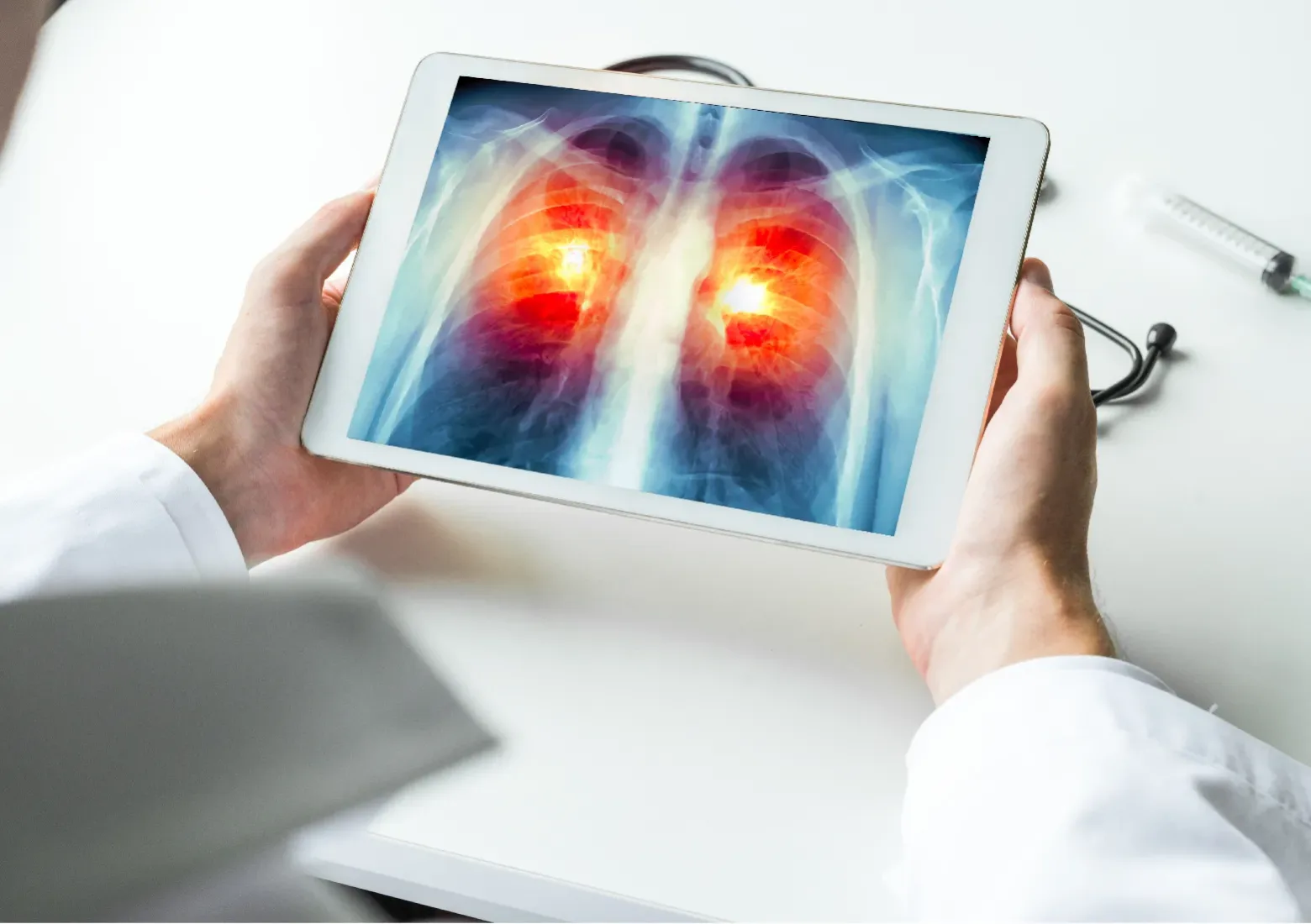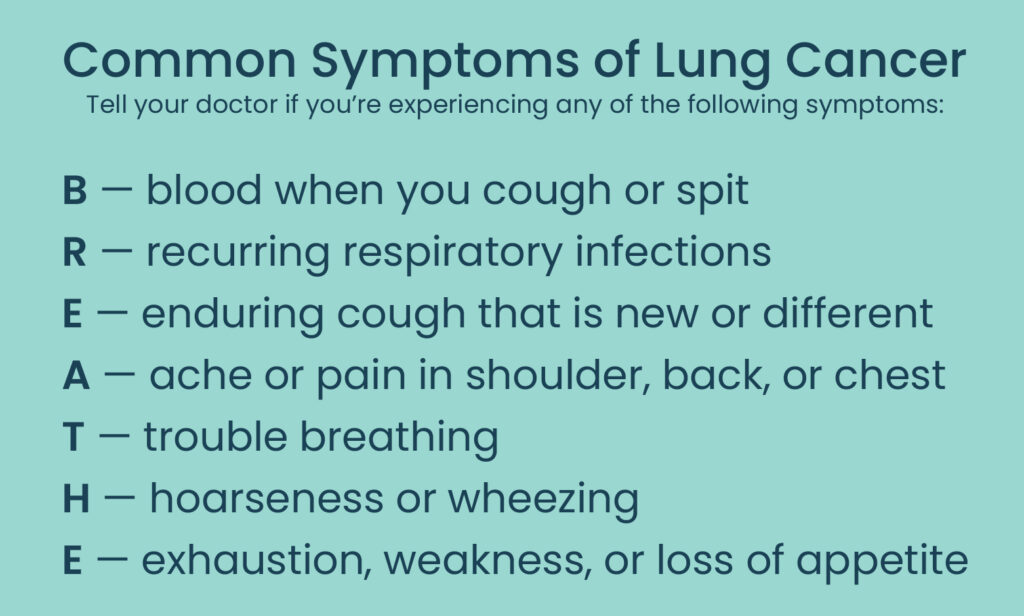Detect Lung Cancer Early
November 12 • 2021

Lung cancer is the 2nd most common cancer in both men and women and is the leading cause of cancer deaths worldwide.
Over time, lung cancer has taken the lives of far too many. In fact, roughly 131,880 lives are lost annually just in the U.S. alone. Maybe you’ve known one of those people – whether it was a close friend or a family member, a parent or even your spouse. Maybe you’ve wondered, had it been found early on that special someone could’ve lived a little longer or beat the disease entirely.
Sadly, 8 million U.S. adults who are considered high risk could benefit from a lung cancer screening. Unfortunately, only 5.7% of those adults actually get screened.

What is a lung cancer screening?
A lung cancer screening is an assessment that is used to detect lung cancer in generally healthy people who are deemed high risk who are not showing any signs or symptoms. They are used mainly to detect lung cancer at its earliest stage – when it’s more treatable – as they can reduce the risk of dying from the disease. Lung cancer found at an early stage when it’s still small and before it spreads, has a higher likelihood of being treated successfully. In fact, lung cancer typically diagnosed due to signs and symptoms is usually too advanced for curative treatment – meaning the cancer is too far along.
Are there different types of lung cancer screenings?
Though you can have a regular chest x-ray done, these are typically not recommended as a screening since they do not help prolong the patient’s life. Low dose lung CT scans are the recommended type of screening in detecting abnormalities in the lungs that could be cancerous. These screenings help lower the risk of dying from lung cancer and are suggested for current or former smokers who are considered high risk.
Who is considered high risk for lung cancer?
▪ Older adults (typically 55-77 years of age) who are current or former smokers.
▪ Adults who have heavily smoked for several years: this may include people who have smoked a pack a day for 30 years, 2 packs a day for 15 years, or half a pack a day for 60 years or less. While your smoking habits have changed over the years, it’s still important to consider your past smoking history to determine whether you still may be a candidate for lung cancer screening.
▪ Adults who once heavily smoked but have since quit: this may include someone who has heavily smoked in the last 15 years.
▪ Adults with a history of lung cancer: those who have been treated for lung cancer more than 5 years ago.
▪ Generally healthy adults: those who have serious health problems are less likely to benefit from a lung cancer screening and could potentially experience complications from follow-up tests. Since lung cancer sometimes requires surgery, screening is generally not offered to those who have poor lung function or other serious conditions that don’t make them a suitable candidate for surgery.
How to see if you qualify for a low dose lung CT Scan:
During your annual physical, your doctor will ask you a series of questions relating to your smoking history. If your doctor determines you’re high risk, they will explain your risk and how you may benefit from a lung cancer screening. They will also walk you through what to expect during the screening and how you can schedule the appointment at our Imaging Center. Lung cancer screenings are covered by Medicare and most private health insurance plans.
What to expect during a lung cancer screening:
During a low dose lung CT at our Imaging Center, you will be given a pillow and be asked to lie on your back. The imaging tech will then move to a separate room where they can still see and talk to you. You will be asked to remain very still while the table slides in and out of the CT machine that will create the scans of your lungs. Once the tech is ready to start the scan, they will have you briefly hold your breath to create clear images of your lungs. Our team of specialists will provide the appropriate care and follow up if there are any abnormal findings on the scan. The overall appointment lasts roughly 30 minutes from start to finish, and the scan itself takes less than a minute.
Why should I consider getting a lung cancer screening?
For those who qualify as high risk for lung cancer, this screening can reduce your chance of death by 20%. Though a low dose lung CT scan will not find all lung cancers, there is a much lower chance of dying from lung cancer – which accounts for many deaths in those who are current or former smokers.

Every year worldwide, more people die from lung cancer than from breast, colon, and prostate cancer combined.
For those who qualify as high risk for lung cancer, this screening can reduce your chance of death by 20%. Though a low dose lung CT scan will not find all lung cancers, there is a much lower chance of dying from lung cancer – which accounts for many deaths in those who are current or former smokers.
For those who currently smoke, it is highly recommended that you get counseling to help stop. Your doctor should inform you of your risk of getting lung cancer and refer you to a smoking cessation program – a program designed to help people quit smoking. Screening alone is not an alternative to stopping smoking. Those who choose to take the steps to quit smoking are lowering their risk of getting and dying from lung cancer.
To see if you qualify for a lung cancer screening, schedule your annual physical today by calling (470) 369-9739 or book online. Act now, don’t wait.

References:
- Guide to quitting smoking: https://www.cancer.org/healthy/stay-away-from-tobacco/guide-quitting-smoking.html
- https://www.cancer.org/healthy/stay-away-from-tobacco/guide-quitting-smoking/deciding-to-quit-smoking-and-making-a-plan.html
- https://www.cancer.org/cancer/lung-cancer/detection-diagnosis-staging/detection.html
- https://www.cancer.org/cancer/lung-cancer/about/key-statistics.html
- https://www.lungcancerresearchfoundation.org/lung-cancer-facts/